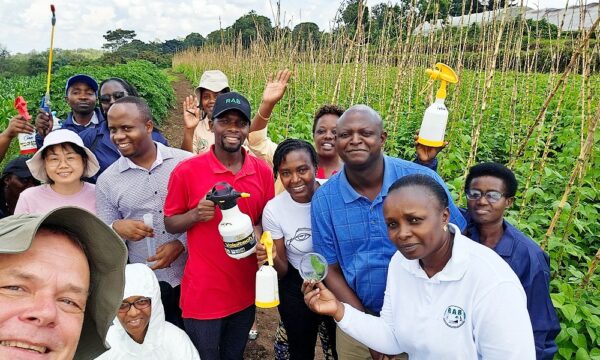Recent articles in Science, the NY Times and Nature have suggested that we should embrace invasive species and the resultant “novel ecosystems” and that those that do battle with such species are verging on xenophobic. This is a common cycle in many fields and I’m told that a discussion thread is considered closed once a poster has been described as xeonophobic or worse, if so this discussion could be over before it even begins. Nevertheless, a group of scientists and practitioners wrote a response which can be found on the ISSG website. The issues are certainly complex. It is true that preserving pristine ecosystems is a lost goal and there are probably none in existence anymore, but to do nothing and indeed to try to argue that the new system is one worth accepting suggests that the authors have either given up in the face of too difficult a task, or have seen an opportunity to publish something controversial. There are certainly “profits” of doom to be had on both sides. In order to get your invasive management project funded it is necessary to take the public with you and when engaging with the media evocative negative language can appear in print. On the other side it is easier to stand out from fellow authors if you challenge an accepted paradigm. In the case of weeds, it is generally understood that monocultures of the new plant are less biodiverse but more productive than the flora they replace and depending on your priorities their arrival could be a good or a bad thing. If we accept that biodiversity is a priority there are few arguments to be had for introducing new invasive exotic species except for biocontrol where the excellent paper by Van Driesche and many co-authors shows the potential benefits. It is this tool that was notably overlooked in the discussions despite choosing the Galapagos as a case study where there are excellent targets for weed biocontrol yet no funding has materialised despite the vast sums spent on vertebrate eradications.
Open discussions are valuable and provocative articles can stimulate debate. However, it is important that all parties show balance especially in the current climate when funding for the environment globally is under severe pressure. Any unnecessary doubt over the wisdom of supporting invasive species management efforts could result in decisions being made that have long lasting and severe consequences. I’m pleased to say that Science has since published a series of strong rebuttals, one from the heads of key environmental organisations. And Nature has done the same including one from 141 eminent signatories. Finally the CBD Secretariat put its weight behind the rebuttals and issued a communiqué supporting the struggle against invasive species. In short, I think as far as the debate is concerned, normal service has been resumed.
Further reading:
Vince, G. (2011) Embracing Invasives. Science. 331 (6023): 1383-1384.
Raffles, H. (2011) Mother Nature’s Melting Pot. The New York Times: The Opinion Pages. [Online] 2nd April, 2011.
Davis, M.A., Chew, M.K., Hobbs, R.J., Lugo, A.E., Ewel, J.J., Vermeij, G.J., Brown, J.H., Rosenzweig, M.L., Gardener, M.R., Carroll, S.C., Thompson, K., Pickett, S.T.A., Stromberg, J.C., Del Tredici, P., Suding, K.N., Ehrenfeld, J.G., Grime, J.P., Mascaro, J. & Briggs, J.C. (2011) Don’t judge species on their origins. Nature. 474: 153-154.
IUCN/SSC Invasive Species Specialist Group (ISSG). We need to strengthen, not weaken, the struggle against harmful invasive species: An ISSG response to recent articles calling is to re-think the struggle against biological invasions. [Online] 15th June, 2011.
Van Driesche, R.G., Carruthers, R.I., Center, T., Hoddle, M.S., Hough-Goldstein, J., Morin, L., Smith, L., Wagner, D.L., Blossey, B., Brancatini, V., Casagrande, R., Causton, C.E., Coetzee, J.A., Cuda, J., Ding, J., Fowler, S.V., Frank, J.H., Fuester, R., Goolsby, J., Grodowitz, M., Heard, T.A., Hill, M.P., Hoffman, J.H., Huber, J., Julien, M., Kairo, M.T.K., Kenis, M., Mason, P., Medal, J., Messing, R., Miller, R., Moore, A., Neuenschwander, P., Newman, R., Norambuena, H., Palmer, W.A., Pemberton, R., Perez Panduro, A., Pratt, P.D., Rayamajhi, M., Salom, S., Sands, D., Schooler, S., Schwarzländer, Sheppard, A., Shaw, R., Tipping, P.W. & van Klinken, R.D. Classical biological control for the protection of natural ecosystems. Biological Control. 54 (Supplement 1): S2-S33.
Lambertini, M., Leape, J., Marton-Lefèvre, J., Mittermeier, R.A., Rose, M., Robinson, J.G., Stuart, S.N., Waldman, B. & Genovesi, P. Invasives: A Major Conservation Threat. Science. 333 (6041): 404-405.
Simberloff, D. (2011) Non-natives: 141 scientists object. Nature. 475 (7354): 36.
Convention on Biological Diversity (CBD). (2011) Communiqué: Struggle against invasive species remains important goal for global Strategic Plan for Biodiversity: Secretariat of the Convention on Biological Diversity supports recent statement by conservation organizations. [Online] 1st August, 2011.
Related News & Blogs
Biological control in action: Zambia’s field days on fighting fall armyworm
Experts from CABI recently held two field days and an expo in Zambia, showcasing innovative approaches to pest management to 584 farmers, agro-dealers and other stakeholders to help raise awareness of approaches to tackle the invasive fall armyworm (Sp…
11 June 2025





